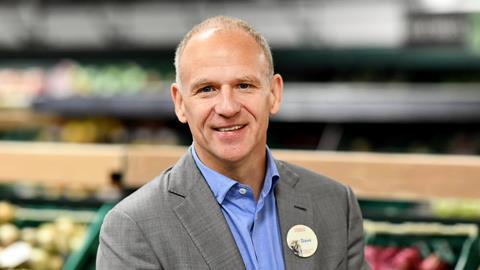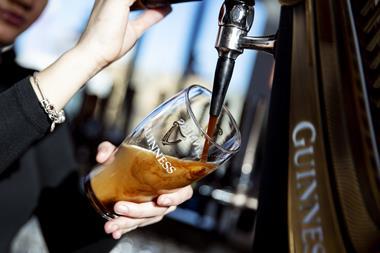In April 2015, Dave Lewis marked his first ever annual results in charge of Tesco with a £6.4bn pre-tax loss.
Unsurprisingly, given the scale of the loss – one of the largest of such figures in British corporate history – investors weren’t impressed. Tesco’s share price suffered its worst dip for two years, and it seemed Lewis’ turnaround strategy was on the rocks before it had even begun.
The former Unilever veteran, however, remained bullish. “I haven’t looked at the share price… I’ll look tonight or tomorrow,” he said, striding out of the London Stock Exchange. “This is a long-term game and shareholders will take their own view.”
By the time Lewis stepped down as CEO in 2020, Tesco was back in the black, having also stabilised its market share, slashed £1.5bn in costs, sold off international businesses and completed a £3.7bn capture of wholesaler Booker.
And while the City didn’t thank him as enthusiastically as it could have (share prices can be a curious mistress), there was little doubt that – having overcome a slew of profit warnings, spiralling debt and a major accounting scandal – Lewis was, to use the words of Shore Capital director Clive Black, “the bloke that saved Tesco”.
Now, more than a decade on, Lewis has been tasked with repeating the trick, having been appointed CEO of struggling drinks giant Diageo. Is he the right man for the job?
Diageo’s woes
Lewis joins Diageo at a time when the business is in considerably better shape than Tesco was when he took over in 2014.
However, the London-listed company has undeniably drifted since the untimely death of former CEO Ivan Menezes in June 2023. Both his successor Debra Crew and current interim boss Nik Jhangiani failed to win over investors, who remain cautious of shifting consumer habits and sluggish sales.
The share price has been on a downward trajectory since overstocking issues in Latin America prompted a shock profit warning in November 2023, and is now trading at less than half its Covid-era peak.
“Issues in Latin America pointed towards poor management insight, as Diageo appeared to take its eye off the ball and didn’t know how much stock was in the supply chain,” says Dan Coatsworth, head of markets at AJ Bell. “Shifting consumer habits also caught the company off guard, with weaker demand for premium spirits and the rise of younger people less interested in alcohol.”
Flat first quarter sales and a downgrade to guidance revealed by Diageo last week suggest Lewis may – as he did at Tesco – need time to work his magic.
Lewis’ credentials
But there’s no doubting Lewis’ pedigree. His successful Tesco turnaround, following one of the most turbulent periods in its history, cemented his reputation. Combined with a 27-year stint at Unilever, it helped establish him as “the outstanding consumer goods CEO of his generation”, according to former Diageo corporate relations director Ian Wright.
“The Lewis hallmarks are that he is thorough, extremely able and a potent combination of thoughtful and action-orientated,” Wright says. “He led the remarkable turnaround of Tesco and he had earlier been a key architect of countless Unilever successes.”
Jefferies analysts Ed Mundy and Sebastian Hickman, meanwhile, highlight Lewis’ strong focus on costs and operational performance at Tesco. “He focused on restoring financial health and credibility,” they say. “He streamlined operations, aggressively took costs down, simplified the SKU count, and reduced Tesco’s value disadvantage to discounters.”
Indeed, it was Lewis’ aggressive cost-cutting and obsession with SKU rationalisation that earned him the nickname ‘Drastic Dave’ at Unilever. “Some of his decisions were unpopular at the time, but many were the right ones to get the job done,” notes Coatsworth.
Diageo – which is embarking on an ambitious $625m cost-cutting programme of its own, as well as eyeing further disposals to boost its balance sheet – will certainly be hoping Lewis hasn’t gone soft in his time away from frontline CEO duties.
Calm in a crisis
Another key attraction for Diageo will have been Lewis’ ability to navigate a crisis. During the pandemic he “regularly answered the call of government as a go-to troubleshooter and adviser”, Wright points out. As then-chief executive of the civil service, Diageo chair John Manzoni will have watched Lewis “operating at very close quarters”, he says.
That experience may well have tipped the balance in Lewis’ favour over interim boss Jhangiani, who had been widely expected to get the gig.
The most obvious gap on Lewis’ CV is a lack of experience in the alcohol sector, which comes with its own intricacies and quirks. He has also been away from frontline management since his exit from Tesco in 2020.
Nonetheless, his fmcg credentials are formidable. He has chaired Haleon since 2022, also sitting as a non-executive board director of PepsiCo. In his near 30-year career at Unilever, Lewis held senior roles across South America, Indonesia and the Americas, and also served as chairman of Unilever UK.
For the top job at Diageo, these roles are “perhaps even more relevant” than his Tesco experience, says Bernstein analyst Trevor Stirling, who credits Lewis as being “instrumental in the development of the Dove brand”.
Diageo, long known for its big-budget brand-building, is now facing leaner times as consumers cut back on premium spirits. Lewis is expected to demand more efficiency from its marketing teams, and will likely be drawing on his own experience to ensure they deliver more with less.
Market reaction
The markets appear to approve of the appointment. Diageo shares soared over 7% in early trading, more than offsetting the slide that followed last week’s trading update.
“Topline turnarounds take time; but we think Sir Dave has the right toolkit for Diageo,” says Stirling. Coatsworth, meanwhile, says Diageo has “pulled a blinder” in persuading Lewis to “put on his CEO boots again”.
“Lewis is more likely to have been driven by the size of the task,” he says. “Pull off a second business recovery of this scale and he’ll become a legend in the business world.”
The challenge remains a significant one – short and longer-term headwinds threaten to resign Diageo’s blockbuster post-Covid growth to a distant memory, while investors are impatient following the mis-step of hiring Crew and further stagnation under Jhiangiani.
Bringing in a rank outsider in Lewis is a risk, but Diageo clearly believes a drastic change is necessary.
Will it work? Wright certainly believes so. “The smart money will be that the gamble pays off, but perhaps not without the odd scare en route.”

























No comments yet